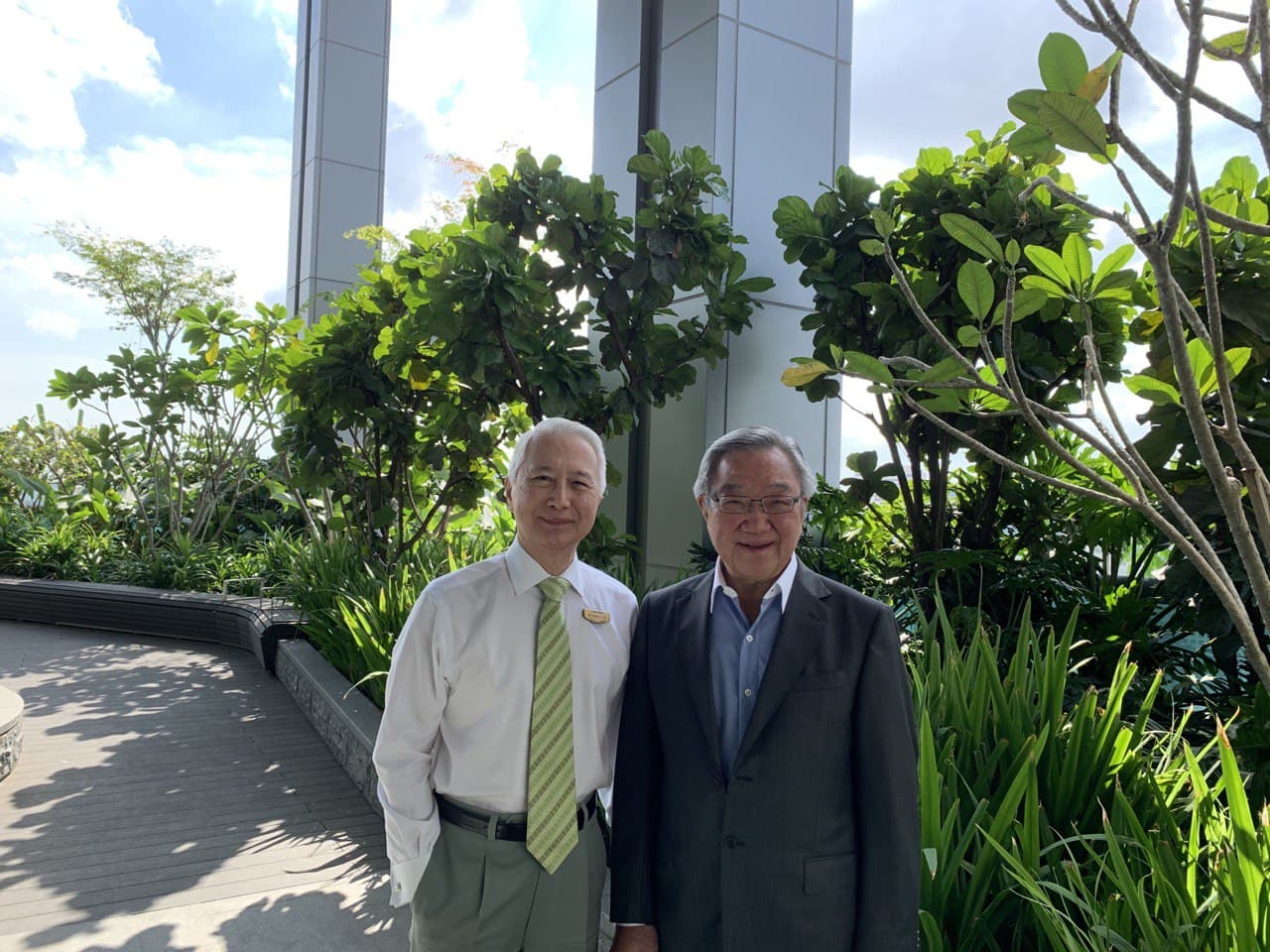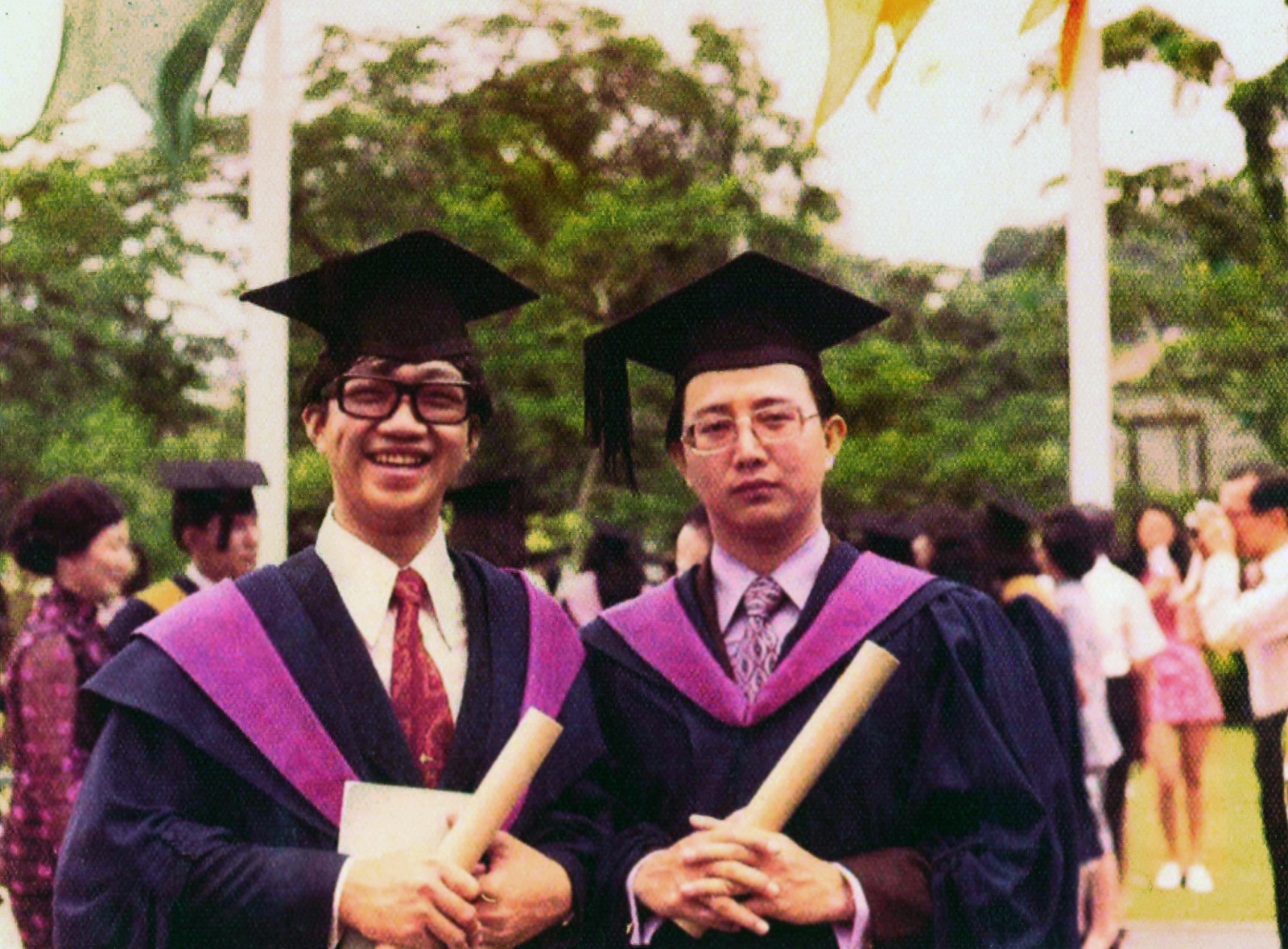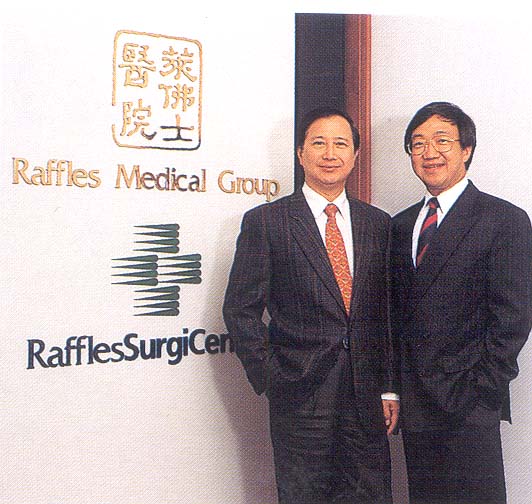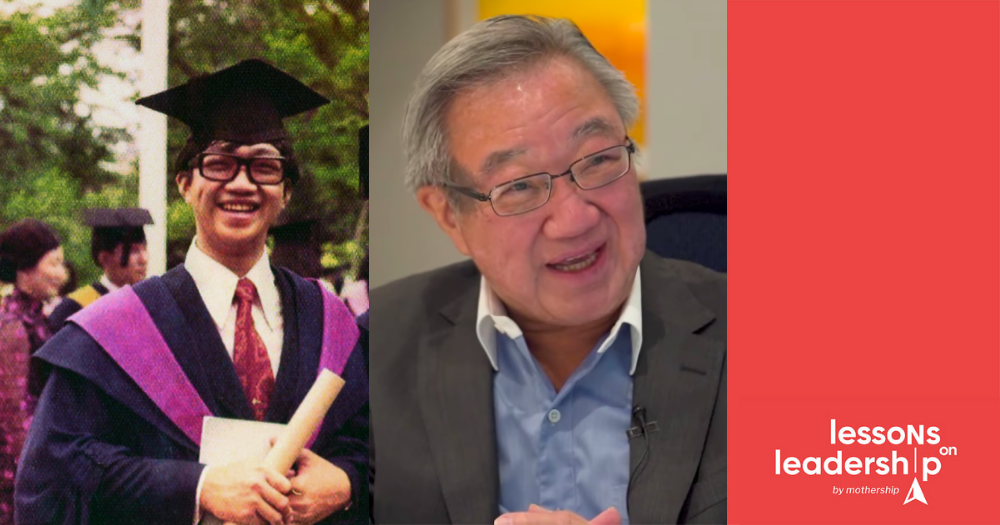Follow us on Telegram for the latest updates: https://t.me/mothershipsg
COMMENTARY: "So with that kind of background, right, when you're asked to help, how to not help?"
72-year-old Dr. Loo Choon Yong, co-founder and executive chairman of Raffles Medical Group, has more than four decades of experience running a medical practice and being a doctor under his belt.
 Loo (right) with Raffles Medical co-founder Dr. Alfred Loh (left). Photo by Jeanette Tan.
Loo (right) with Raffles Medical co-founder Dr. Alfred Loh (left). Photo by Jeanette Tan.
However, his path to where he is today was not always clear. As a schoolboy, he was interested in physics and science, and also had a keen passion for reading.
Instead of becoming a scientist, though, Loo was encouraged by his father to pursue medicine as a way to support the family, and his six other siblings in particular.
As part of Lessons on Leadership, a new Mothership series hoping to inspire the next generation of Singaporeans through the stories of Singapore’s many successful business leaders and entrepreneurs, Loo shares more about his experiences growing up in 1960's Singapore.
By Dr Loo Choon Yong
I never wanted to be a doctor, by the way.
Father worked three jobs
The truth is, we always had to borrow money. My father, who worked in a bank, had to borrow money from a friend who was an unregistered dentist, and repay it after my father received his 3 months annual bonus.
I mean, banking jobs were considered very good jobs actually. My father, he was educated and bilingual, and for his time, that was not bad.
He kept us together by teaching English for an hour at a primary school in the weekday mornings, working in a bank five and a half days a week, and on alternate evenings giving tuition or teaching at the night school.
His only leisure time was Sunday. On Sunday he would bring us to church, because we were a Christian family. And in the afternoon, he played mahjong with his friends. That's all.
Everyone slept in one room
And we (my parents and seven of us children) stayed in one room! I did not have a bed. So I slept on a bedsheet, a canvas actually, which was very good — very cool, you know.
One place we stayed was a warehouse that was partitioned. The partition was not soundproof.
And then, you know, you had a row of rooms like that. So you had a door, but in the day you usually put a curtain for a bit of privacy. No air conditioning, of course. If there were windows opened, you could actually get some cool air.
Then a common kitchen.
The toilet was a monsoon drain and just zinc roof, with a door and that's it. No flushing, you just do it.
This is how we grew up.
Choosing to go to Raffles Institution
I'm eternally grateful to Mr. Wee, my Primary 6 teacher.
My father was his classmate in Presbyterian Boys' School, which was supposed to be quite a good school pre-war.
So when it came to Primary 6, and it was time to choose a secondary school, my father put Presbyterian Boys' as the only choice — very convenient, we were staying just near there..
I mean, I was a fairly good student — always second boy, never first. The first always rotated, I was consistent.
Mr Wee was also very strict. I remember he said, "Come" — he always called us like that, with a beckoning index finger — "Come. Choon Yong. You take this form and tell your father, put Raffles Institution as first choice. If he really wants PBS, all right, second choice. You can leave the third choice blank.”
That's what he told me.
I went back — I mean I didn't know anything right? — "Ah pa, Mr. Wee say this." Fortunately, ah pa did that. That's how I went to RI.
And I had the shock of my life. Everybody was so smart. Smarter than you, left right centre. And I thought to myself, wah, don't play a fool with this.
Developed love for reading
From the time I was 13 years old, I never stopped reading. I would read different things, and I discovered the beauty of reading and of words!
Can you imagine? Because you must remember that before that, we only studied. We were studying for our exams, not actually reading. 读书,不是看书。
So in my family, we did not have this tradition of reading for leisure or for pleasure.
Books were expensive. The only books I had were those I won every year as a prize. The prizes they give you — there would be a bookshop that came to the school, and you would choose the books.
So those were the few books I had, that I won every year for being second in the cohort.
I had never gone to the library until Sec 1. When I was in RI, I went to the National Library in Bras Basah. And... wah, I was really reading almost a book every day. That's when I read Charles Dickens and all the classics.
And that's when you begin, you know, the pleasure of reading — the words can convey images. Isn’t that why we read? They can describe the forest in Africa, the wild river and so on.
And the words pop up with meaning, because you're not studying for the information to regurgitate for tests.
Deciding to become a doctor
When time came to decide what subjects to focus on for my O-Levels — so that was around Sec 3 — you had to decide between arts or science, so science sounded logical.
I was good in those subjects; I preferred those.
Then the A-Levels — called Pre-U in those days — you had to decide: it could be engineering, pure science, or medicine, which has got biology or zoology, botany and others.
Or arts — usually it would be economics, history and so on.
And so my father said, “What do you want to do?”
I said, “I want to go and be a scientist — nuclear scientist, physics", and you must remember, during that time nuclear energy was a big thing.
Then he told me, "Doesn't seem like a good idea. Singapore, you're not going to go into these things." I mean, we're talking about the 60s. We were becoming independent and we were a small country.
And he said, “Why don't you do medicine?” Because, he said,
“I never see a doctor starving. Doctors should be able to make a decent living, you can help me with all your siblings.”
At that time, my father was already a manager at the bank. But he had so many kids that were all around university age.
My older sister went to work in a bank as a teller after her O-Levels to help the family income.
My older brother, he was in university or about to go — he's three years older than me. So probably he was in first year university. No NS at that time yet.
So that's what my father told me. I thought okay. I didn't mind studying medicine. So with that kind of background, right, when you're asked to help, how not to help?
And so that was that.
 Loo (left) and Loh (right) at their graduation from NUS medical school in 1973. Photo courtesy of Raffles Medical Group.
Loo (left) and Loh (right) at their graduation from NUS medical school in 1973. Photo courtesy of Raffles Medical Group.
Love for reading still exists to this day, work is thinking
These days, I read a lot of newspapers, periodicals, whatever. And books too, like Obama's memoir.
Of course, I still work. My work is thinking, right? Can I stop thinking?
I do think about what Biden is going to do. That’s not work. I think about Singapore's future as well, that's not my work.
But I also think about my work. And for work, I do more than thinking. I arrange things, I get people together, new ideas, new services.
We have a businesslike way of managing our practice from 45 years ago. You need to have some profit to be sustainable.
But the abiding motivation for us was always: how do we look after our patients well and better? And that was the idealism that drove us to expand; since more people liked our care, we just kept expanding to serve them.
 Loh and Loo at the opening of Raffles Surgicentre in 1995. Photo courtesy of Raffles Medical Group.
Loh and Loo at the opening of Raffles Surgicentre in 1995. Photo courtesy of Raffles Medical Group.
I think work gives you meaning — for me at least — and I come to work to strengthen this platform, this idea; make it better, help my younger colleagues make the decisions, choose people, help groom the younger people.
This is how we renew ourselves. We are now into the seventh generation of GPs, fourth generation of specialists.
We keep getting younger people into the practice, guide them, make sure they do well. And then in due course, they become leaders themselves and they will help us continue this grooming of successive generations of physicians.
But well, if [my work] doesn't make sense, not enjoyable, I will stop doing it.
Read our interview with Dr. Loo and his co-founder Dr. Alfred Loh about their 50-plus-year friendship:
Top photos via Mothership video and courtesy of Raffles Medical Group. Some quotes have been edited for clarity and grammar.
If you like what you read, follow us on Facebook, Instagram, Twitter and Telegram to get the latest updates.
